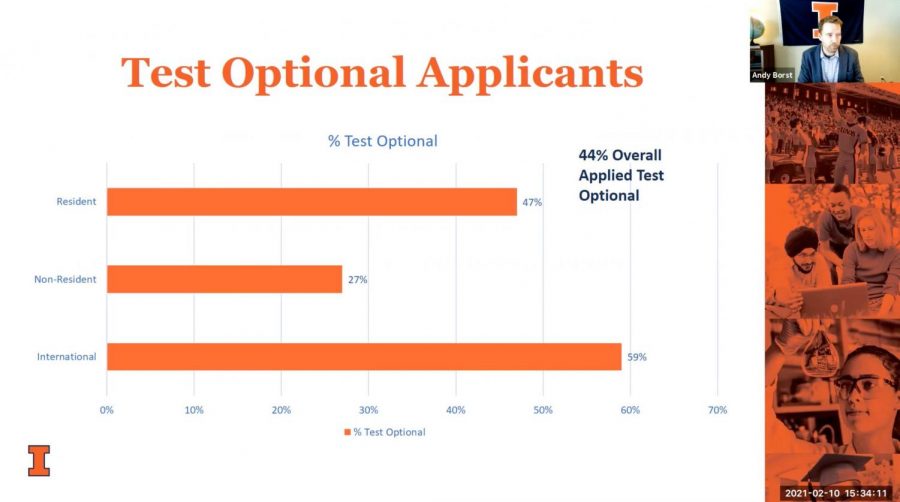University extends test-optional policy for next two admissions cycles
Screenshot of Zoom Director of Undergraduate Admissions
Andy Borst presents information about University applicants during the Admissions Subcommittee of the Academic Senate meeting. For the next two admissions cycles, students will have the option of submitting their test scores.
April 8, 2021
In response to the detrimental effect COVID-19 has had on the accessibility of standardized testing, the University of Illinois System Board of Trustees unanimously approved a request last Thursday to extend the test-optional policy through both the 2022-2023 and 2023-2024 academic years.
This development aligns with the previous academic year’s removal of the standardized testing requirement for applications submitted to the University. During the previous admissions cycle, approximately 44% of first-year applicants for the fall 2021 semester opted not to submit standardized test scores, according to Director of Undergraduate Admissions Andy Borst.
According to a presentation delivered at the Admissions Subcommittee of the Academic Senate, freshman applicants will be able to decide whether they wish to have their SAT or ACT scores considered. Regardless of whether they send the scores or not, their answer to the question will determine whether the University considers their scores.
Home-schooled students, athletes and those with a General Educational Diploma will have the option of opting to not submit their scores should they wish not to. Additionally, the upper division transfer applicants will not be required to submit scores. However, lower division transfer applicants will be required to. Transfer applicants are grouped based on the amount of credits they have why entering the University.
Applicants who opt out of submitting their standardized scores but have not finished at least three years of “secondary education in an English-speaking country” must submit TOEFL/IELTS scores.
The decision to implement a test-optional policy for the next two academic years was purely due to the limited nature of standardized testing opportunities for students in a COVID-19 dominated world and not in response to other concerns related to fairness that have prompted some universities in the nation to forgo the requirement in its entirety.
“The decision to create a test-optional policy and to extend it further was due to the lack of ACT/SAT testing opportunities for students,” Borst said in an email. “The on-going COVID-19 pandemic limits students’ opportunities to take the ACT/SAT.”
Prior to the Board of Trustees’ meeting, the Admissions Subcommittee of the Academic Senate had met twice to deliberate the test-optional policy, opting to vote in favor of it during the second meeting in March.
“Enrollment Management did a presentation to the Admissions Subcommittee in early Spring (of 2020) during a standing meeting to discuss the Test Optional policy,” Borst said in an email. “The Admissions Subcommittee discussed its recommendation and asked members to go back to their respective faculty colleagues to discuss the policy further.”
Following these discussions with respective faculty and colleagues, the Senate gathered in March and found that there was “overwhelming support for a test optional policy given the significant impact of COVID-19,” according to AD.21.03: “Implementation of a Test Optional Policy for the 2022 and 2023 Admissions Cycles.” In a pool of 114 responses, 84% indicated approval.
Many students can attest to the disruptive nature of COVID-19 on the schedule of standardized tests.
“In terms of the SAT, they were really unclear when it would take place,” said Gil Montiel, junior at Plainfield East High School. “They didn’t have a set date for a while. We just found out two weeks ago that it would take place on April 13.”
Because of the University’s decision to implement a test-optional policy, Montiel is more likely to apply and appreciates the emphasis on GPA as opposed to a simple standardized test score.
“I prefer the University focusing more on GPA and extracurriculars because I think it is a better indication of students as individuals and their academic performance versus just one standardized test,” Montiel said.
While the policy is only being extended to the next two admissions cycles, the Senate voted in favor of creating a Task Force to “evaluate the efficacy and fairness of entrance exams and the need for applicants to report scores beyond the 2021 cycle,” according to AD.21.03: “Implementation of a Test Optional Policy for the 2022 and 2023 Admissions Cycles.”
The decision to extend the test-optional policy for the next two admissions cycles will enable the University to collect data and determine whether they wish to extend this policy further.







